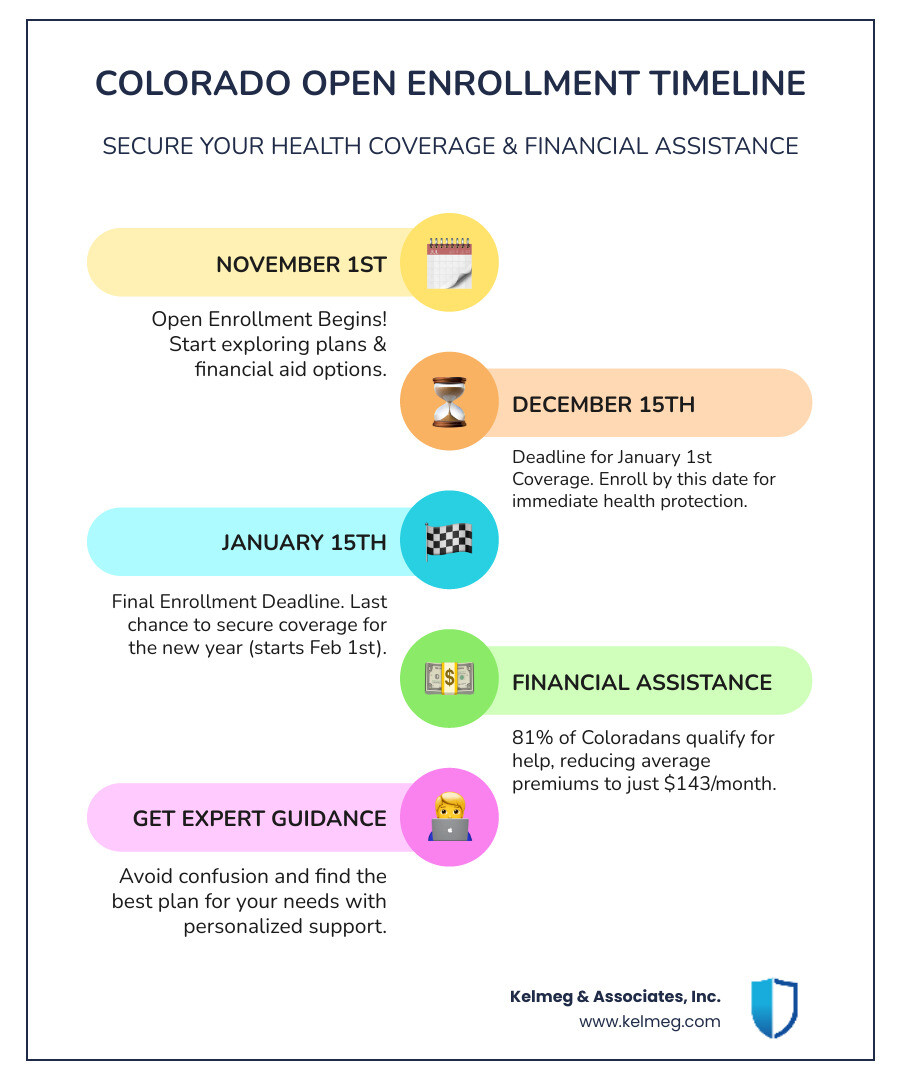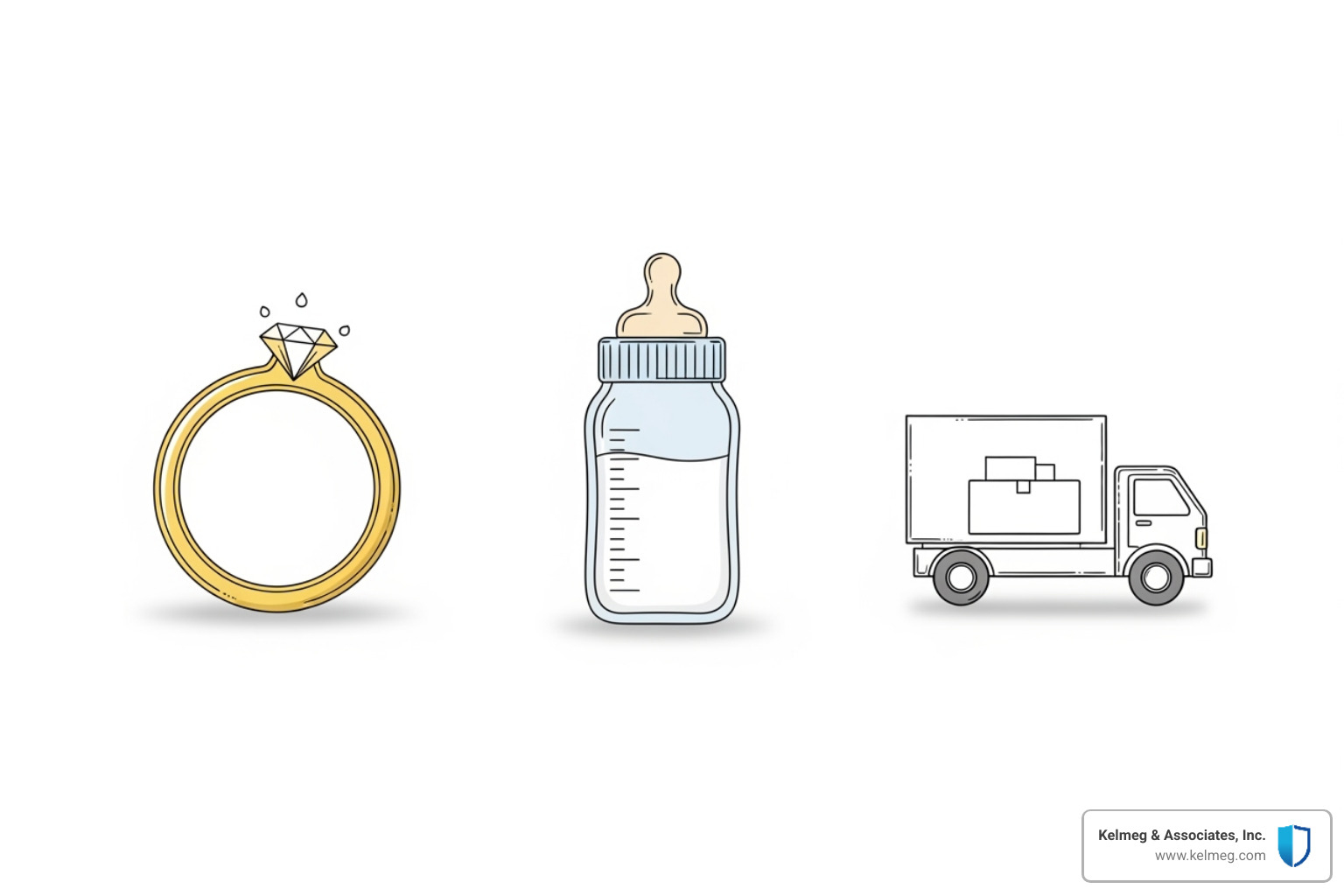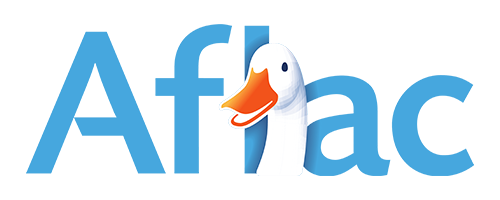Open Enrollment in Colorado Made Easy (Yes, Really!)
Your Guide to Getting Covered
Colorado open enrollment health insurance is the single most important time of year for securing health coverage that protects your physical and financial well-being. For a few weeks each year, the health insurance marketplace opens its doors, allowing you to enroll in a new plan, change your existing one, and, most importantly, access financial help to make it affordable. In a state like Colorado, where an active lifestyle is the norm, having a robust health plan is not a luxury-it's an essential tool for a secure future. An unexpected illness or injury can happen to anyone, and the cost of medical care without insurance can be financially devastating.
Here are the key facts you need to know about this critical period:
Key Colorado Open Enrollment Facts:
- When: The enrollment window runs from November 1 to January 15 each year.
- Deadline for January 1 Coverage: You must enroll by December 15 for your plan to start on the first day of the new year.
- Final Deadline: The absolute last day to enroll is January 15 for coverage that begins February 1.
- Who Can Enroll: Nearly all Colorado residents are eligible to purchase a plan through the marketplace.
- Financial Help is Available: A staggering 81% of customers who enroll qualify for financial assistance, significantly lowering their monthly costs.
- Where to Get Help: You can steer the system alone, but a licensed broker like Kelmeg & Associates can provide expert guidance at no cost to you.
Navigating the Colorado open enrollment health insurance process can feel like a monumental task. With 166 different health plans to choose from, filled with confusing jargon and complex details, it is easy to feel overwhelmed. However, you are not alone. Last year, over 212,000 Coloradans successfully enrolled in a plan, and the vast majority found coverage that fit their budget. With financial aid, the average monthly premium for those who qualified was just $143. The secret to a successful and stress-free enrollment is not trying to become an expert overnight but partnering with someone who already is.
I'm Kelsey Mackley, an insurance specialist at Kelmeg & Associates, Inc. My mission is to help Colorado families and individuals cut through the confusion. I work for you, not the insurance companies, to find a plan that truly aligns with your healthcare needs and financial situation. My goal is to simplify Colorado open enrollment health insurance, empowering you to make a confident choice and gain the profound peace of mind that comes with knowing you are protected.

What is Health Insurance Open Enrollment in Colorado?
Health insurance acts as a vital financial safety net. Its primary purpose is to protect you and your family from the potentially catastrophic costs of medical care, whether it is for a sudden emergency or a chronic condition. Beyond that, it provides access to routine and preventive care that helps you stay healthy and detect potential issues early, before they become more serious and costly. In Colorado, individuals and families who do not get coverage through an employer or a government program like Medicare typically purchase their insurance through our state's official marketplace, Connect for Health Colorado. Every plan sold on this marketplace is compliant with the Affordable Care Act (ACA) . This is a critical protection, as it guarantees that plans must cover essential benefits and cannot deny you coverage or charge you more due to a pre-existing condition.
Colorado open enrollment health insurance is the specific, limited time frame each year when almost anyone can sign up for a new health insurance plan or make changes to their current one through the marketplace.
Why This Period is So Important
For the majority of people, this brief annual window is the only opportunity to secure ACA-compliant health coverage for the entire year. Missing the January 15 deadline could mean going without insurance until the next open enrollment period, leaving you completely exposed to the high cost of healthcare. A single trip to the emergency room or an unexpected diagnosis could lead to tens of thousands of dollars in medical debt. Furthermore, this period is your only chance to access the federal and state financial assistance programs that make coverage affordable for most Coloradans. Enrolling in a plan provides more than just financial protection; it offers invaluable peace of mind, allowing you to live your life knowing that you have a plan in place for the unexpected.
Key Terms to Know Before You Start
Understanding the language of health insurance is the first step to choosing a plan with confidence. Here are the core terms you will encounter:
- Premium: This is your fixed, recurring monthly payment to the insurance company to keep your plan active. Think of it like a subscription fee for your coverage.
- Deductible: This is the amount of money you must pay out-of-pocket for covered healthcare services before your insurance plan begins to pay. For example, if your plan has a $3,000 deductible, you pay the first $3,000 of covered services yourself. After that, you typically only pay a copayment or coinsurance, and the insurance company pays the rest.
- Copayment (Copay): A fixed amount (for example, $40) that you pay for a specific covered healthcare service, such as a doctor's visit or a prescription drug. You usually pay copays after your deductible has been met, but some plans offer certain services (like primary care visits) with a copay even before you have met your deductible.
- Coinsurance: This is your share of the costs of a covered healthcare service, calculated as a percentage (for example, 20%) of the allowed amount for the service. You start paying coinsurance after you have met your deductible. If your plan has 20% coinsurance for a hospital stay that costs $10,000, you would pay $2,000 (after your deductible is met), and the insurance company would pay the remaining $8,000.
- Out-of-Pocket Maximum: This is the absolute most you will have to pay for covered services in a plan year. This amount includes money you spend on deductibles, copayments, and coinsurance. Once you reach your out-of-pocket maximum, your health plan pays 100% of the costs for all covered benefits for the rest of the plan year. This is a crucial feature that protects you from unlimited medical costs in a worst-case scenario.
- Network: The network consists of the doctors, hospitals, specialists, and other healthcare providers that have a contract with your insurance company to provide services at pre-negotiated, lower costs. Staying "in-network" is key to keeping your costs down. Going "out-of-network" can result in much higher bills or no coverage at all, depending on your plan type.
- Metal Tiers: Plans on the marketplace are categorized into four levels: Bronze, Silver, Gold, and Platinum. These tiers do not reflect the quality of care but rather how you and your insurer will share the costs. Bronze plans have the lowest monthly premiums but the highest out-of-pocket costs, while Platinum plans have the highest premiums but the lowest costs when you need care.
Navigating the Colorado Open Enrollment Health Insurance Period
Successfully navigating Colorado open enrollment health insurance comes down to preparation and understanding the key steps. Knowing the critical dates, where to find reliable help, and what documents to have ready will transform a potentially stressful process into a manageable one. Colorado's official health insurance marketplace, Connect for Health Colorado, is your portal to coverage, and having a clear roadmap will make the journey much smoother.
When is Open Enrollment? Key Deadlines for Colorado Open Enrollment Health Insurance
Mark your calendar with these essential dates for the annual Colorado open enrollment health insurance period. This period is fixed and runs from November 1st through January 15th. Missing these deadlines can have significant consequences for your health coverage for the upcoming year.

- Enroll by December 15th for January 1st Coverage: To ensure your health plan is active on the first day of the new year, you must complete your enrollment and make your first payment by December 15th. This is the most common goal for enrollees, as it prevents any gap in coverage.
- Enroll by January 15th for February 1st Coverage: If you miss the December deadline, you still have a chance. Enrolling between December 16th and the final deadline of January 15th will result in your coverage beginning on February 1st.
Failing to enroll by the final January 15th deadline means you will likely be unable to get an ACA-compliant health insurance plan for the rest of the year, unless you experience a specific life event that grants you a Special Enrollment Period.
Where Can I Enroll in a Health Plan?
Connect for Health Colorado is the state's official marketplace and the only place where you can apply for and receive financial assistance to lower your costs. While you are free to use their online portal to enroll on your own, partnering with a certified and licensed broker, like us at Kelmeg & Associates, provides you with expert, personalized guidance at no extra cost to you.
With 166 different health plans from multiple insurance carriers, the sheer volume of choices can be paralyzing. A DIY approach often leads to common pitfalls, such as miscalculating income (which can lead to tax penalties), choosing a plan with a network that does not include your trusted doctors, or picking a plan based solely on a low premium without understanding its high out-of-pocket costs. We help you avoid these mistakes by:
- Conducting a thorough needs analysis, discussing your preferred doctors, necessary prescription drugs, and overall budget.
- Accurately calculating your household income to determine your eligibility for all available financial assistance and maximize your savings.
- Comparing plans side-by-side based on total estimated annual costs, not just the monthly premium.
- Carefully guiding you through the application to ensure it is accurate, complete, and submitted correctly.
This dedicated support is why 62% of customers chose to enroll with the guidance of a broker last year. Our commitment is to build a lasting relationship, providing support and advice not just during enrollment but throughout the entire year.
What You Need to Apply for Colorado Open Enrollment Health Insurance
Being prepared is the key to a fast and smooth application process. Gather the following information for yourself and anyone in your household who needs coverage before you begin:
- Basic Personal Information: Full legal names, dates of birth, and Social Security Numbers for every person applying.
- Contact Information: Your home and mailing addresses (if different) and a primary phone number and email address.
- Household and Tax Information: Who you will claim on your tax return for the upcoming year, how you file taxes (e.g., single, married filing jointly), and information about anyone you claim as a dependent.
- Income Information: This is critical for determining financial aid. You will need to project your household's total income for the plan year. Gather documents like pay stubs, W-2 forms, tax returns, and records of any other income sources, such as self-employment, unemployment benefits, Social Security benefits, or investment income.
- Immigration Documents: If you are a lawfully present immigrant, you will need information from your immigration documents, such as your Permanent Resident Card (Green Card) or other relevant paperwork.
- Current Coverage Information: If you currently have health insurance, have the policy numbers and plan details available. You will also need information about any job-based health insurance that is available to your household, even if you are not enrolled in it, as this can affect your eligibility for subsidies.
Decoding Your Plan Options & Costs
When you begin exploring your Colorado open enrollment health insurance options, you might be pleasantly surprised to find that high-quality, comprehensive coverage can be affordable. The key lies in understanding the different types of plans available and, most importantly, the financial help designed to bring them within reach.
Understanding the "Metal Tiers": Platinum, Gold, Silver, and Bronze
Plans on the Connect for Health Colorado marketplace are organized into four "metal tiers." These categories are not a measure of the quality of care or the doctors in the network. Instead, they indicate how you and your insurance plan will share the costs of your healthcare. This is based on a plan's "actuarial value," which is the average percentage of total costs it covers for a standard population.
-
Bronze Plans: These plans are designed with the lowest monthly premiums. In exchange, they have the highest out-of-pocket costs, meaning you will pay more for your deductible, copays, and coinsurance when you need medical care. A Bronze plan is often a good fit for healthy individuals or young people who want reliable protection against a major, high-cost medical event (like a serious accident or illness) but do not expect to use their insurance frequently.
-
Silver Plans: Silver plans represent a middle ground, with moderate monthly premiums and more moderate out-of-pocket costs. However, their true value is open uped for those who qualify for financial assistance. Silver plans are the only tier eligible for extra savings called Cost-Sharing Reductions (CSRs), which can dramatically lower your deductible and other costs, often providing a value similar to a Gold or Platinum plan for the price of a Silver one. For this reason, they are often the best value on the marketplace.
-
Gold Plans: These plans feature higher monthly premiums but significantly lower costs when you access care. With lower deductibles and copays, Gold plans are an excellent choice for individuals or families who anticipate needing regular medical care, such as frequent doctor visits, ongoing treatments for a chronic condition, or planned surgeries. The higher premium provides more predictable, manageable costs throughout the year.
-
Platinum Plans: Offering the highest monthly premiums, Platinum plans provide the most comprehensive coverage with the lowest out-of-pocket costs. These plans have very low (or sometimes no) deductibles, meaning the insurance company starts paying its share almost immediately. A Platinum plan is best suited for those who expect to have significant healthcare needs and want the highest level of certainty and the lowest possible costs when they receive care.
Can I Get Financial Help? APTCs and CSRs Explained
This is the most critical part of the affordability equation: the vast majority of people qualify for financial assistance. For 2025, it is estimated that 81% of customers will qualify for financial help, and an incredible three out of five may find a plan for $10 or less per month! This financial aid is only available when you enroll through Connect for Health Colorado. It comes in two main forms:
- Advanced Premium Tax Credits (APTCs): This is an instant tax credit that you can use right away to lower your monthly premium. Instead of waiting to claim it on your tax return, the government sends the credit directly to your insurance company each month. Eligibility is based on your estimated household income for the year. Thanks to recent legislation, the income cap for receiving APTCs has been temporarily removed, meaning more people than ever before can qualify for this assistance.
- Cost-Sharing Reductions (CSRs): These are extra savings that go beyond lowering your premium. CSRs reduce your out-of-pocket costs by lowering your deductible, copayments, and coinsurance. This means you pay less each time you visit the doctor or get a prescription. To receive these powerful extra savings, you must enroll in a Silver plan, and your income must fall between 100% and 250% of the Federal Poverty Level. A Silver plan with CSRs can increase its actuarial value from 70% to as high as 94%, offering Platinum-level benefits at a Silver-level price.
In 2023, these combined subsidies lowered the average monthly premium to just $143 for qualifying Coloradans.

Special Programs: The Colorado Option and Other State Initiatives
Colorado is a leader in creating innovative programs to make healthcare more affordable and accessible:
- The Colorado Option: This is a unique state-supervised program that requires insurance companies to offer more affordable, standardized health plans. Colorado Option plans are available in every county, come in Bronze, Silver, and Gold tiers, and are designed to reduce racial health disparities and lower premiums over time. They feature simpler benefits, including $0 primary care and mental health visits before the deductible, and a more culturally responsive network of providers.
- OmniSalud: This groundbreaking program provides a safe and trusted way for undocumented Coloradans to enroll in affordable health insurance. Using state funding, OmniSalud provides financial assistance, similar to APTCs, to make premiums affordable for those who are otherwise ineligible for federal aid due to their immigration status. This program ensures more Colorado residents have the security of health coverage. Re-enrollment is required each year.
- Expanded Public Coverage: Colorado has also expanded eligibility for its public health programs, Health First Colorado (Medicaid) and Child Health Plan Plus (CHP+), to cover more children and pregnant individuals regardless of their immigration status, furthering the state's goal of ensuring all Coloradans have a pathway to coverage.
Missed Open Enrollment? You Still Have Options
If the January 15th deadline for Colorado open enrollment health insurance has passed, you might feel like you have missed your chance for coverage. However, you may still be able to enroll in a comprehensive health plan. A Special Enrollment Period (SEP) provides a 60-day window to sign up for coverage outside of the standard open enrollment timeframe if you experience a major life change.
At Kelmeg & Associates, we are experts in navigating these complex rules and can help you determine if your situation qualifies you for an SEP or other year-round coverage options.
What is a Qualifying Life Event (QLE)?
A Qualifying Life Event (QLE) is a significant change in your personal circumstances that impacts your health insurance needs or eligibility. Events like getting married, having a baby, or losing your job-based health insurance are all considered QLEs. When one of these events occurs, it triggers a Special Enrollment Period, allowing you to enroll in a new marketplace plan.

Typically, you have a 60-day window from the date of the QLE to select and enroll in a new plan. It is also vital to report any household or income changes to the marketplace within 30 days. This ensures your financial assistance is calculated correctly and can trigger an SEP if applicable. You will likely need to provide documentation to prove your QLE, such as a marriage certificate, birth certificate, or a letter from your former employer confirming your loss of coverage.
Common Qualifying Life Events
There are several categories of QLEs. You may qualify for a Special Enrollment Period if you experience one of the following:
- Loss of Health Coverage: This is one of the most common QLEs. It includes losing your job-based insurance (whether you were laid off or quit), aging off a parent's plan when you turn 26, losing your eligibility for Medicaid or CHP+, or losing coverage through a divorce. Voluntarily dropping your coverage or losing it because you did not pay your premiums does not count.
- Changes in Household: Getting married is a QLE that allows you and your new spouse to enroll in a plan together. Having a baby, adopting a child, or placing a child for foster care also qualifies you. A divorce or legal separation can also be a QLE if it results in a loss of coverage. A death in the household that affects your eligibility for your current plan is another example.
- Moving: A permanent move to a new ZIP code or county where new health plan options are available can qualify you for an SEP. This also includes moving to Colorado from another state or country.
- Changes in Income: A significant change in your household income that affects your eligibility for premium tax credits or cost-sharing reductions can trigger an SEP.
- Other Complex Events: Other situations that may qualify you include gaining U.S. citizenship or lawful presence, being released from incarceration, or being a member of a federally recognized tribe (who can enroll or change plans once a month).
What If I Don't Qualify for an SEP?
If you missed open enrollment and do not have a QLE, your options for comprehensive coverage are limited, but you are not entirely without choices. You may be eligible for year-round enrollment in Health First Colorado(Colorado's Medicaid program) or Child Health Plan Plus (CHP+) if your income is within the limits for those programs. If not, you might consider a short-term health plan. However, it is crucial to understand their limitations. Short-term plans are not ACA-compliant. They are not required to cover essential health benefits, can deny you coverage for pre-existing conditions, and have annual or lifetime coverage limits. They should be considered only as a temporary bridge to comprehensive coverage and not a long-term solution.
Frequently Asked Questions about Colorado Open Enrollment
Over the years, we have helped hundreds of Colorado families and individuals steer the complexities of Colorado open enrollment health insurance. In doing so, we have heard many of the same questions and concerns. Here are clear, straightforward answers to some of the most common questions we receive.
Can I buy a plan directly from an insurance company?
Yes, you can purchase a health plan directly from an insurance carrier, a practice known as buying "off-exchange." However, this is almost always a mistake from a financial perspective. Connect for Health Colorado is the only place where you can access financial help, such as Advanced Premium Tax Credits (APTCs) and Cost-Sharing Reductions (CSRs). All plans sold in Colorado, whether on or off the marketplace, must meet the same quality and benefit standards set by the Colorado Division of Insurance. By going direct, you are likely looking at the exact same plans but will be required to pay the full price. With 81% of marketplace customers expected to qualify for financial help, you would be leaving significant savings on the table.
Do I have to renew my plan every year?
While most marketplace plans are set to auto-renew if you do nothing, relying on this is a risky strategy that can cost you money and lead to inadequate coverage. It is essential to actively review your options every single year during Colorado open enrollment health insurance. Here is why: plans, prices, and provider networks change annually. The prescription drugs covered by your plan (the formulary) can change. Your trusted doctor might leave your plan's network. Your premium could increase significantly, or a new plan might be introduced that offers much better value for your specific needs. Furthermore, your own health and financial situation can change. An annual review with a broker ensures you have the absolute best coverage for your current circumstances and can save you hundreds or even thousands of dollars over the year.
What if my income changes during the year?
It is absolutely crucial to report any changes in your household income to Connect for Health Colorado within 30 days of the change. Your financial assistance is based on the annual income you estimate when you apply. If your income increases and you fail to report it, the premium tax credits you received may have been too high. You could be required to pay back some or all of that assistance when you file your federal income taxes, leading to an unexpected and potentially large tax bill. Conversely, if your income decreases, you might be eligible for even more financial help, including larger premium tax credits or eligibility for Cost-Sharing Reductions or even Medicaid. Promptly reporting changes ensures your coverage remains affordable and protects you from unpleasant surprises at tax time.
What if I am self-employed or a freelancer?
Navigating health insurance is a common challenge for the self-employed. The good news is that the marketplace is designed for you. You can purchase an individual or family plan through Connect for Health Colorado and are eligible for the same financial assistance as anyone else based on your net self-employment income. A broker can be especially valuable in this situation, helping you accurately project your variable income for the year to maximize your subsidies and avoid tax complications.
What about those cheap health plans I see advertised online?
Be very cautious of plans advertised with extremely low prices, especially if they are not found on the official Connect for Health Colorado marketplace. These are often not comprehensive health insurance. They may be short-term plans, fixed indemnity plans, or healthcare sharing ministries. These types of plans are not regulated in the same way as ACA-compliant plans, can deny coverage for pre-existing conditions, do not have to cover the essential health benefits (like maternity care or mental health services), and often have caps on how much they will pay. While they may seem cheap upfront, they can leave you with massive bills if you have a serious medical event. True, affordable coverage is found through the official marketplace, where you can get financial help to lower the cost of a quality plan.
Get Expert Guidance for Your Colorado Health Insurance Needs
Choosing the right health insurance plan during the Colorado open enrollment health insurance period is one of the most important financial and health decisions you will make all year. It does not have to be a stressful or confusing ordeal. You do not have to spend hours trying to decipher complex plan documents, steer government websites, and calculate subsidies on your own.
At Kelmeg & Associates, we specialize in simplifying this entire process for individuals, families, and self-employed professionals across Colorado, including in communities like Lafayette, Broomfield, Boulder, and Adams County. As local Colorado experts, we have a deep understanding of our state's unique healthcare landscape, from the specific plans available in your area to the innovative programs like the Colorado Option and OmniSalud.
Our professional, certified guidance comes at absolutely no extra cost to you. We are compensated directly by the insurance companies for the plans we sell. This means your monthly premium is the exact same price whether you enroll with our expert assistance or go it alone. You get the benefit of a dedicated, licensed professional who works for you, without paying a penny more for it.
We specialize in Personal Health Insurance Colorado . Our process begins by listening. We take the time to understand your unique situation: your budget, your medical needs, which doctors you want to keep, and what prescription drugs you take. We then translate the complex options into plain English, helping you confidently select a plan that truly fits your life. We will double-check to ensure your preferred doctors are in-network and that your critical medications are covered.
With 166 different health plans on the market, it is no wonder that professional guidance is so valuable-it is why 62% of all customers used a broker to enroll last year. Do not risk making a costly mistake, feeling confused by the options, or settling for a plan that is not the right fit for you and your family.
Contact an expert for personalized help today. Let us show you how much easier, faster, and more affordable finding the right health coverage can be. Your health, your financial security, and your peace of mind are far too important to leave to chance.













